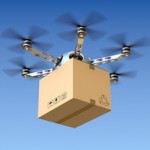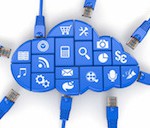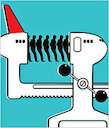I have a confession to make. I play the lottery. Yes, I understand math implies I have a better chance of being struck by lightning than of winning the jackpot, but it’s only a couple of bucks a week and ultimately somebody has to win, so who knows. I reveal this dark secret in order to set the stage for a demonstration of the ineptitude of government agency running a business: The Georgia Lottery Commission. Although to be fair it would appear the Georgia Legislature had an equal hand in the stupidity I am about to reveal.
A few years ago the GLC actually did something beneficial for their customers, they added the ability to buy lottery tickets on line. You can buy nearly everything else on line, why not lottery tickets? The process itself was a bit convoluted, you couldn’t just pay with a credit card or Paypal, you had to open a pseudo-Discover debit card called the “iHope Card” that you had to first fund from a bank account before you could play. However the card acted like a debit card so you could in theory get at your money whenever you needed it. More on that later.
In the beginning the process worked well. Every 3 months I’d buy 26 draws of the same number and then not think about it for another 3 months. Click and forget, very easy. Occasionally if jackpots got huge I might pick up a few more tickets from the comfort of home. Unfortunately that has all ended. In the past few months either a new law was passed or the GLC simply got around to enforcing an existing law. The upshot is that one must now be physically located in the state of Georgia to buy a Georgia lottery ticket. This is where we enter the Twilight Zone. Only government would craft its business model around the ideal of striving toward FEWER sales and LESS revenue by artificially restricting its customer base. I thought the revenue raised by the lottery was for funding in-state education. If people in other states want to send money to Georgia voluntarily to help educate children here, exactly what is the problem with that?
In any event, in order to ensure this asinine edict is upheld the GLC implemented a new software check that attempts to determine one’s computer location based on a combination of IP address and local Wi-Fi networks. Sounds simple enough to the uninitiated, but for those who work in IT like myself it is evident that such an approach will be fraught with false negatives. I know because I was caught up in their net and became intimately familiar with the methods they are using. One must have two (or possibly many more, they really don’t know) Wi-Fi networks nearby (this cuts out anyone not living in a dense urban environment). Likewise, one can’t be running the Mac OS because the GLC software mistakes a core function of OS X (Remote Management) as something that might interfere in location determination (it can’t). The GLC even laughably suggests one buy a Wi-Fi extender to find more networks – that’s like suggesting one buy stronger binoculars to see better in the dark. GLC’s new motto: It is better that a thousand Georgians be inconvenienced than for one Alabaman near the border to buy a lotto ticket. Brilliant.
The second act in this drama gets even more interesting (all lawyers pay close attention to this one). Seeing as how I could not use my account to buy tickets on line anymore, I opted to transfer funds back to my bank account and close the iHope account. Alas, I soon discovered you are only allowed to transfer WINNINGS out of an iHope account to a bank account (this fact confirmed by calling support when I was unable to transfer all funds). Any money that you originally transferred to it from a bank account cannot subsequently be transferred back. So what’s the problem? Well, first, that is an idiotic artificial limitation, but secondly, that information is not disclosed anywhere. I scoured the account agreement (where it should have been) and do not see any mention of this fact. Astoundingly enough their website FAQ clearly contradicts their policy by stating that
“CAN I TRANSFER MY WINNINGS FROM MY IHOPECARD ACCOUNT TO MY BANK ACCOUNT? Yes. Transfer your winnings, or any funds originating from your bank account, to your registered bank account.”
Repeated attempts to inform their tech support their FAQ was wrong resulted only them parroting the FAQ back to me. I would characterize this blatant omission and ongoing contradiction of a material fact regarding how the iHope account functions as fraud. Any interested class action attorneys – I will leave you to it.



